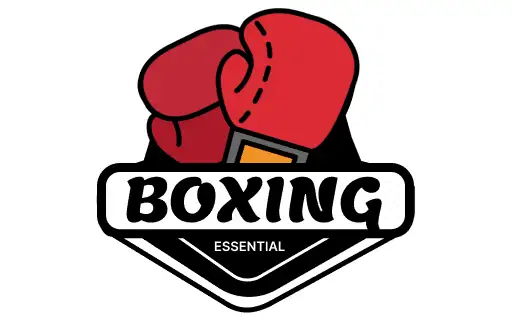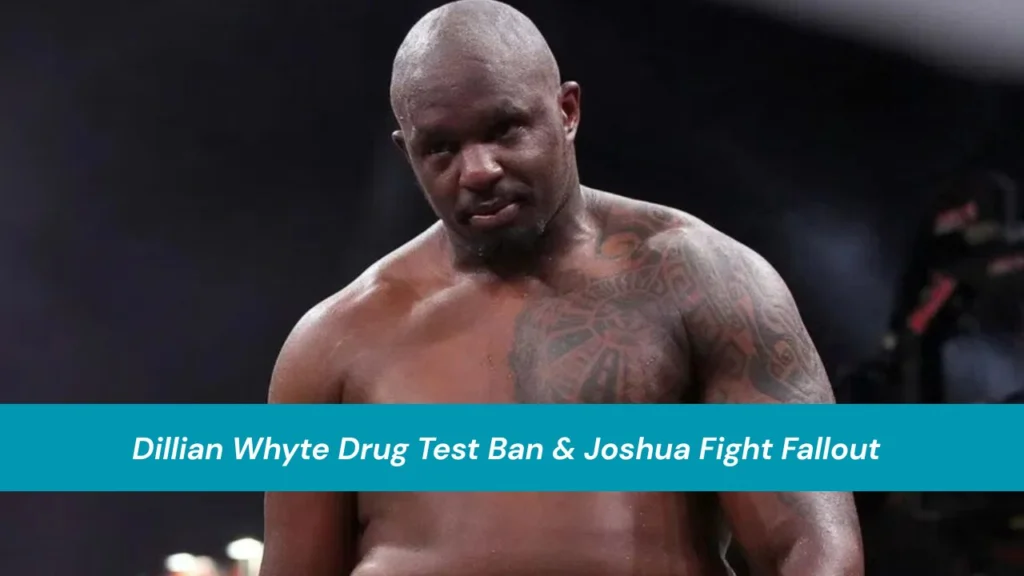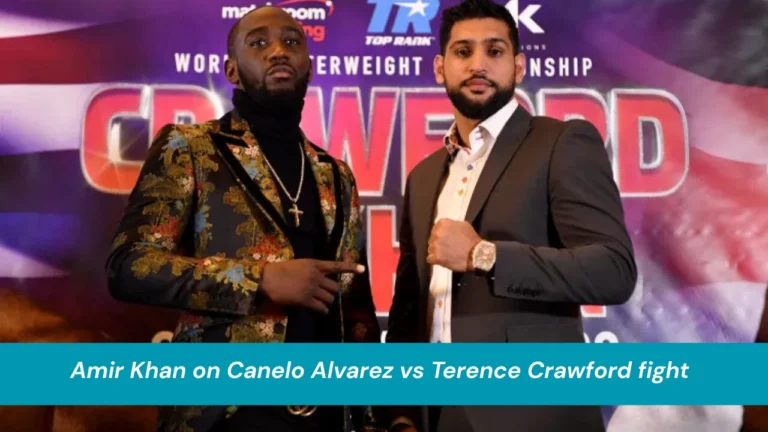The story of Dillian Whyte’s career cannot be told without addressing the shadow of drug testing. Over the years, the British heavyweight has been involved in two major controversies, both of which disrupted his progress and cast doubt on his credibility. The phrase “Dillian Whyte drug test” became a headline across the boxing world in 2012 when he served a two-year suspension, and again in 2023 when a positive result forced the cancellation of his much-anticipated rematch with Anthony Joshua. The twists and turns of these incidents reveal not only the challenges faced by athletes navigating supplement use but also the way doping allegations can alter a fighter’s reputation and future.
This article dives deep into the details of What Dillian Whyte tested positive for, how his bans and investigations unfolded, and what lessons both he and the sport of boxing can learn from these episodes.
Key Takeaways
- Dillian Whyte’s career was twice disrupted by drug testing issues, first with a two-year ban in 2012 and later with a cancelled Anthony Joshua rematch in 2023.
- The 2012 ban stemmed from methylhexaneamine found in a supplement, reinforcing strict liability rules for athletes.
- The 2023 adverse finding was later traced to a contaminated supplement, clearing Whyte of intentional doping.
- Repeated controversies highlight the risks of supplement use and the lasting impact on reputation, earnings, and trust in boxing.
The 2012 Methylhexaneamine Ban A Career on Hold
Dillian Whyte’s first run-in with anti-doping rules came in 2012, only a year after his professional debut. At the time, Whyte was an undefeated heavyweight prospect with eight wins under his belt. That momentum came to a halt when he tested positive for methylhexaneamine (often abbreviated as MHA), a stimulant once common in bodybuilding supplements and pre-workout powders.
Methylhexaneamine is classified as a banned substance under the World Anti-Doping Agency’s prohibited list because it can enhance alertness, stamina, and performance. Whyte had ingested the compound unknowingly through a supplement called Jack3d, a product popular at gyms but notorious for containing unlisted stimulants. Although he insisted he did not knowingly consume anything illegal, the United Kingdom Anti-Doping agency (UKAD) held him responsible for failing to properly vet his supplements.
The tribunal imposed a two-year ban, ruling that while Whyte may not have intended to cheat, negligence played a decisive role. His professional record also took a hit, as his victory over Sandor Balogh was overturned and changed to a “no contest.” The ban, which lasted from October 2012 to October 2014, sidelined him during what should have been the most formative period of his career.
This early suspension highlighted a recurring theme that would follow Whyte: the tension between athlete responsibility and supplement contamination. Although methylhexaneamine was eventually banned from over-the-counter sales in several countries, Whyte’s career had already paid the price. When he returned in 2014, he was forced to rebuild momentum from scratch.
The 2023 Drug Test Joshua Rematch Cancelled
Fast forward to 2023, Whyte had reestablished himself as a top contender and was preparing for one of the most lucrative fights of his career. A rematch with Anthony Joshua, scheduled for August 12 at the O2 Arena in London, was not only financially significant but also pivotal for both fighters. For Joshua, it was a chance to bounce back after consecutive losses to Oleksandr Usyk. For Whyte, it was an opportunity to avenge his 2015 knockout defeat and prove himself as a legitimate title challenger once again.
But just one week before fight night, disaster struck. The Voluntary Anti-Doping Association (VADA) reported that Whyte’s sample had returned “adverse analytical findings.” In simple terms, traces of a banned substance were detected. Matchroom Boxing, Joshua’s promotional team, immediately announced that the fight would not go ahead, citing the need to protect the sport’s integrity.
The news sent shockwaves through the boxing community. Fans who had already purchased tickets and pay-per-view packages were left disappointed. Joshua was forced to seek a replacement opponent at short notice, ultimately facing Robert Helenius. For Whyte, the incident reignited old accusations that he could not be trusted to compete clean, even though the details of the banned substance were not made public at the time.
Whyte, for his part, issued a passionate statement defending his reputation. He declared himself “shocked and devastated” by the result and insisted that he had never knowingly used performance-enhancing drugs. He also stressed that in previous instances, such as a controversial 2019 case, he had been cleared after further investigation. Still, the timing of the positive test could not have been worse, as it deprived him of one of the most high-profile opportunities of his career.
The Investigation and the Contaminated Supplement
The story did not end with the cancellation. A lengthy investigation was launched, involving independent experts and forensic testing of Whyte’s supplements. Months later, the conclusion was made public: the positive result was caused by a contaminated supplement.
Laboratory analysis revealed that the product Whyte had been using contained trace amounts of a banned substance that was not listed on the label. This finding supported Whyte’s claim that he had not deliberately doped. With this evidence, authorities cleared him of intentional wrongdoing and allowed him to resume his career.
The outcome was a bittersweet victory for Whyte. On the one hand, his name was officially cleared, affirming that he was not deliberately cheating. On the other hand, the damage had already been done. The Joshua fight had been canceled, the financial windfall was lost, and his reputation had been bruised yet again. Even for fans sympathetic to his explanation, the pattern of repeated controversies left lingering doubts.
The Wider Implications for Boxing
The Whyte saga raises important questions about doping control in boxing. Anthony Joshua himself spoke out after the cancellation, calling for more frequent and random drug testing across the sport. According to Joshua, incidents like this erode public trust and discourage fans from investing in big fights that can collapse overnight.
From the perspective of regulators, the case highlights how contaminated supplements remain one of the biggest challenges in anti-doping enforcement. Studies have shown that up to one in five over-the-counter supplements may contain unlisted or adulterated ingredients. For athletes, this creates a minefield: even products that appear legitimate can trigger a failed test.
For Whyte personally, the events reinforced his reputation as a polarizing figure. Supporters argued that he was the victim of bad luck and an imperfect system. Critics, however, pointed out that he should have been more cautious after already serving a two-year ban in 2012. Whether intentional or not, repeated run-ins with anti-doping rules create an impression of carelessness at best and dishonesty at worst.
FAQs
What substance did Dillian Whyte test positive for?
In 2012, Whyte tested positive for methylhexaneamine, a stimulant found in pre-workout supplements like Jack3d. In 2023, the specific banned substance was never officially disclosed, but an investigation concluded that it entered his system through a contaminated supplement.
Why did he receive a two-year ban in 2012?
The tribunal determined that Whyte bore significant fault for not checking the ingredients of his supplements. Even though he did not intend to cheat, strict liability meant he was held accountable.
Was the 2023 positive test intentional?
Independent forensic analysis confirmed it was not. Whyte was ultimately cleared when evidence showed the supplement he used contained an undeclared banned ingredient.
Can the fight with Anthony Joshua still happen?
While there has been speculation about a rescheduled bout, promoters have suggested it is unlikely. The window of opportunity has largely passed, and Joshua has since pursued other opponents.
What lessons can other boxers learn from Whyte’s case?
The most important takeaway is the need for extreme caution with supplements. Athletes are advised to use only products that are batch-tested and certified by independent bodies. Even accidental ingestion can derail a career, damage reputations, and cause financial loss.
Conclusion
Dillian Whyte’s career has been shaped as much by what happened outside the ring as by his performances inside it. The two-year ban in 2012, followed by the devastating cancellation of his 2023 fight with Anthony Joshua, shows how fragile a boxer’s path can be when drug testing is involved. Although he was eventually cleared of wrongdoing in the latest incident, the episode left scars on both his legacy and his earning potential.
The story of the Dillian Whyte drug test controversies ultimately serves as a warning to all athletes. The responsibility to compete clean is absolute, and even inadvertent mistakes can lead to severe consequences. At the same time, it highlights the urgent need for tighter regulation of the supplement industry and more consistent testing protocols in professional boxing.
For Whyte, the future depends on his ability to rebuild trust with fans, promoters, and the sport itself. Whether he can do that will be determined not just by victories in the ring, but by proving once and for all that his career will not be overshadowed by the label of a drug cheat. Visit Boxing Essential to explore more.




